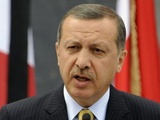|
|
TODAY.AZ / World news
PM Erdoğan lashes out at high interest rates
06 May 2011 [10:42] - TODAY.AZ
 Turkish Prime Minister Recep Tayyip Erdoğan voiced his aim to "cut real interest rates," complaining that it is he who stands in front of the people, not the Central Bank, which currently sets interest rate policies.
Turkish Prime Minister Recep Tayyip Erdoğan voiced his aim to "cut real interest rates," complaining that it is he who stands in front of the people, not the Central Bank, which currently sets interest rate policies.Speaking Thursday at the 4th Istanbul Fashion and Ready Wear Conference, Erdoğan said real interest rates have to fall.
"I don’t have the authority to intervene in the Central Bank," Erdoğan said. "But on the ground it is me, not the Central Bank. I am in front of the people. When someone is aggrieved with interest rates, that person does not go and find Central Bankers, but they go and find me. He does not insult the bankers, he insults me. And I share my thoughts with you here."
Erdoğan repeated his opinion that interest rates and inflation are directly correlated, adding that the idea of raising interest rates will put pressure on inflation is wrong.
"We have to warn the finance sector, that gets rich through selling money," Anatolia news agency quoted Erdoğan as saying. "We put great importance on the solidarity of the finance sector with those who get rich by selling labor or products. We have to be fair in this issue."
Conflicting views
"He is absolutely right," said Gülnur Muradoğlu, a professor of finance at Cass Business School in London. "Due to the crisis, real interest rates in, for example, Britain, are in negative territory. While inflation is between 2-3 percent, the Bank of England’s main interest rate is at 0.5 percent."
An individual can borrow with an annual interest rate of 5 percent to buy a home in Britain, while in Turkey, monthly mortgage interest is at 1 percent, Muradoğlu told the Hürriyet Daily News. "Indeed, real interest rates in Turkey are too high, compared to continental Europe and Britain," said the professor.
Banu Kıvcı Tokalı, deputy general manager at Istanbul-based Destek Securities, disagreed. "Even if we are talking about long-term bond interest rates, which are above 8 percent, we are talking about a limited real interest rate of around 2 percent."
According to Tokalı, ongoing interest rate hikes in emerging economies will put pressure on the Turkish Central Bank, regarding its low interest rate policies. "As the financing of the high current account deficit depends on short-term capital inflows, insistence on a low interest rate climate could result in sudden fluctuations in foreign exchange rates," she said.
/Hurriyet Daily News/
URL: http://www.today.az/news/regions/85708.html
 Print version
Print version
Views: 1894
Connect with us. Get latest news and updates.
See Also
- 25 February 2026 [14:21]
Microsoft founder Bill Gates breaks silence on relations with Epstein - 25 February 2026 [13:42]
Russia’s energy revenues plunge amid sanctions and global shifts - 25 February 2026 [12:02]
Trump on Iran: 'Number 1 sponsor of terror' can't get nukes - 25 February 2026 [09:00]
China adds Japanese organizations to export control list - 25 February 2026 [08:00]
New AI tools hit cyber defense stocks - 24 February 2026 [22:40]
UK tightens measures against chocolate theft - 24 February 2026 [21:43]
Apple moves some desktop production to US - 24 February 2026 [21:22]
NASA delays Artemis rocket launch for urgent repairs - 24 February 2026 [20:40]
Malaysia’s labor productivity rises in 2025 - 24 February 2026 [20:21]
Why China’s AI surge is no longer catching up but setting pace [Op-Ed]
Most Popular
 Guarantees of peace from Armenia: questions remain
Guarantees of peace from Armenia: questions remain
 Greece working with another 4 European countries to set up migrant deportation hubs outside EU
Greece working with another 4 European countries to set up migrant deportation hubs outside EU
 Azerbaijani NGOs urge UK parliament to halt “biased” inquiry on Karabakh
Azerbaijani NGOs urge UK parliament to halt “biased” inquiry on Karabakh
 Azerbaijan Defense Ministry releases weekly summary video [VIDEO]
Azerbaijan Defense Ministry releases weekly summary video [VIDEO]
 US top general Caine thinks war with Iran can be 'easily won'
US top general Caine thinks war with Iran can be 'easily won'
 Vietnam plans national database center to fight misinformation
Vietnam plans national database center to fight misinformation
 Azerbaijan, Austria foster exchange in music education
Azerbaijan, Austria foster exchange in music education
